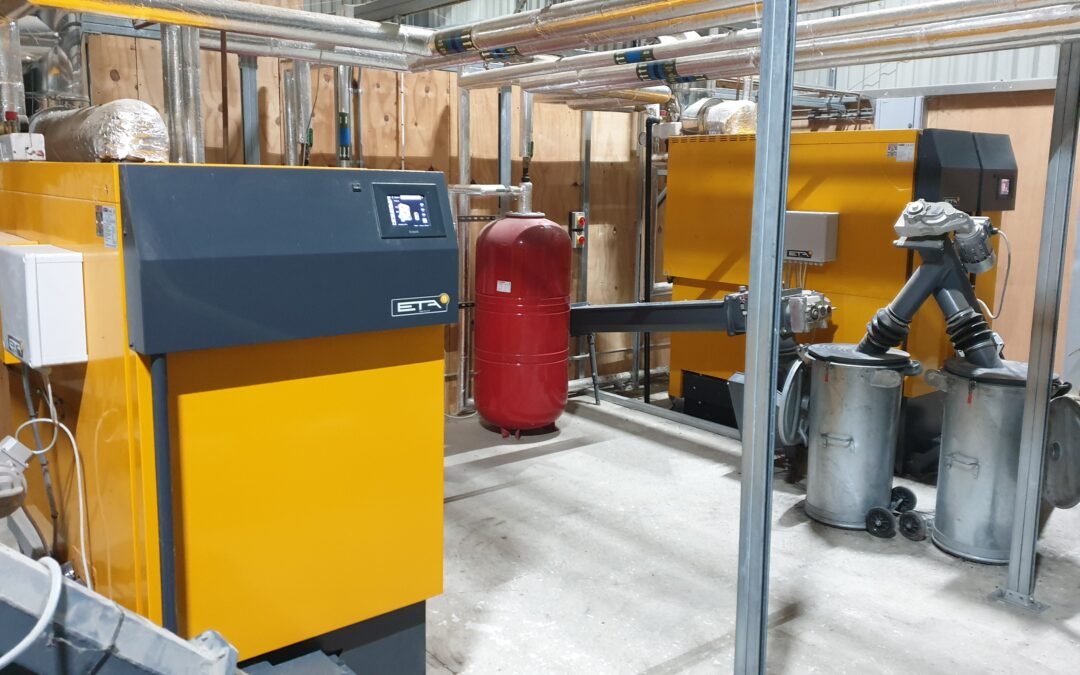As the world becomes more environmentally conscious, many people are looking for ways to reduce their carbon footprint and make their homes and businesses more sustainable. One of the ways to achieve this is by using biomass fuel and biomass boilers. In this article, I will introduce you to biomass boilers and the benefits of using biomass fuel for heating and electricity.
What is a Biomass Boiler and How Does it Work?
A biomass boiler is a renewable heating system that uses organic matter, such as wood pellets, chips, or logs, to generate heat. The boiler burns the biomass fuel to produce hot water or steam, which is then used to heat buildings or generate electricity.
There are two types of biomass boilers:
- Stoker boilers – These boilers use a mechanical system to feed the fuel into the combustion chamber, where it is burned to produce heat.
- Fluidized bed boilers – These boilers use a fluidized bed of sand or other materials to suspend the fuel, allowing for a more efficient combustion process.
Biomass boilers are highly efficient, with some models achieving up to 90% efficiency. They are also versatile, with the ability to use a range of biomass fuels, including wood chips, pellets, and logs.
Advantages of Using Biomass Fuel
There are several advantages to using biomass fuel over traditional fossil fuels, including:
- Renewable – Biomass is a renewable energy source that can be replenished naturally, unlike fossil fuels, which are finite.
- Lower Carbon Emissions – Burning biomass releases carbon dioxide, but the amount released is offset by the carbon absorbed during the growth of the biomass.
- Cost-Effective – Biomass fuel is often cheaper than traditional fossil fuels, making it an attractive option for those looking to save money on heating and electricity bills.
- Reduced Dependence on Fossil Fuels – Using biomass fuels reduces our dependence on fossil fuels, which are becoming increasingly scarce and expensive.
Environmental Benefits of Using Biomass Fuel
Using biomass fuel has several environmental benefits, including:
- Reduced Carbon Footprint – Burning biomass releases carbon dioxide, but the amount released is offset by the carbon absorbed during the growth of the biomass.
- Reduced Air Pollution – Biomass fuel produces less air pollution than traditional fossil fuels, such as coal and oil.
- Reduced Landfill Waste – Biomass fuel is often made from waste materials, such as sawdust and wood chips, which would otherwise end up in landfills.
- Increased Forest Management – Using biomass fuel encourages sustainable forest management practices, which can help to improve the health and biodiversity of forests.
Cost of a Biomass Boiler
The cost of a biomass boiler can vary depending on several factors, including the size of the system, the type of fuel used, and the complexity of the installation.
Generally, a small biomass boiler can cost between £6,000 and £10,000, while larger systems can cost upwards of £20,000. However, the long-term savings on fuel costs can often offset the initial investment.
Grants and Funding for Biomass Boilers
There are several grants and funding options available for those looking to install a biomass boiler. Boiler Upgrade Scheme is a government scheme that provides financial incentives to homeowners and businesses that use renewable heating systems, including biomass boilers. More information about Boiler Upgrade Scheme
The Boiler Upgrade Scheme pays participants a set amount for each unit of renewable heat generated, which can help to offset the cost of installing and maintaining a biomass boiler.
Installing a Biomass Boiler
Installing a biomass boiler is a complex process that should only be carried out by a qualified professional. The installation process can take several days or even weeks, depending on the size and complexity of the system.
Before installing a biomass boiler, it is important to conduct a site survey to determine the best location for the boiler and to ensure that the property is suitable for the installation.
Maintenance and Upkeep of Biomass Boilers
Biomass boilers require regular maintenance and upkeep to ensure that they operate efficiently and safely. Regular cleaning and inspection of the boiler and flue system are essential to prevent the build-up of ash and debris, which can reduce the efficiency of the system and increase the risk of fire.
It is also important to ensure that the fuel used is of good quality and stored correctly, as poor-quality fuel can cause damage to the boiler and reduce its lifespan.
Conclusion and Future of Biomass Fuel and Biomass Boilers
Biomass fuel and biomass boilers are an excellent way to reduce carbon emissions and make homes and businesses more sustainable. With the increasing demand for renewable energy sources, the future of biomass fuel and biomass boilers looks bright.
If you are interested in installing a biomass boiler, be sure to research the options available to you and seek advice from a qualified professional. With the right system and maintenance, a biomass boiler can provide efficient and cost-effective heating and electricity for years to come.
If you’re interested in learning more about biomass boilers and how they can benefit your home or business, contact to Proadvance today to speak with our expert.

